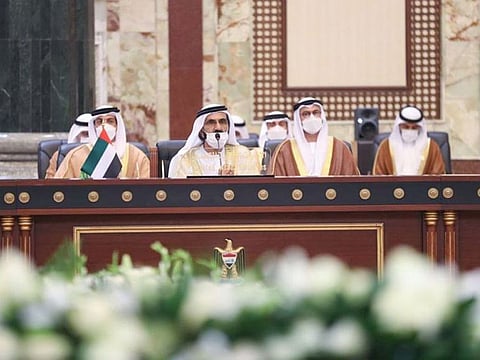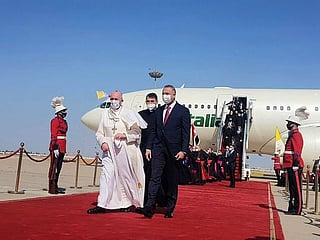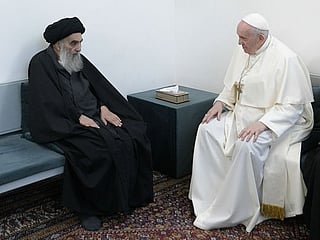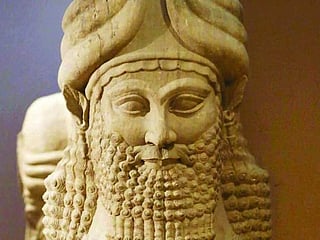Iraq brings all Arabs together in bid to ease tensions
Baghdad’s return to play its role heralds a new chapter of civilization: Mohammed

Baghdad: Arab heads of state and senior officials from the region including Iran and Saudi Arabia met Saturday at a conference hosted by Iraq.
The meeting is aimed at easing Mideast tensions and emphasizing the Arab country’s new role as mediator.
French President Emmanuel Macron was also attending the Baghdad meeting, hailed as a major boost for Iraq and its leadership. The country had been largely shunned by Arab leaders for the past few decades because of security concerns amid back-to-back wars and internal unrest, its airport frequently attacked with rockets by insurgents.
On Saturday, Iraqi leaders were on hand at Baghdad International Airport to receive the red carpet arrivals. They included His Highness Sheikh Mohammed bin Rashid Al Maktoum, Vice-President, Prime Minister and Ruler of Dubai, Egyptian President Abdul Fattah Al Sissi, Jordan’s King Abdullah and Qatar’s Emir Shaikh Tamim bin Hamad Al Thani. It was the first official visit to Iraq by the Qatari emir, whose country’s ties with Saudi Arabia are also fraught with tensions. Relations have improved recently since a declaration was signed with the kingdom and other Arab Gulf states to ease a years-long rift.
His Highness Sheikh Mohammed bin Rashid Al Maktoum, Vice President, Prime Minister and Ruler of Dubai, took part in the “Baghdad Conference for Cooperation and Partnership”, which saw the participation of nine countries.
The conference aimed to boost security and economic cooperation in the Middle East.
In a series of tweets, Sheikh Mohammed said: “Today, I participated in the Baghdad Regional Summit for Cooperation and Partnership.. Baghdad’s return to play its regional and global role heralds a new chapter of civilization.. A big salute to Baghdad, the land of Al Mansour and Al Rasheed.. the land of knowledge, determination and wisdom.. A big salute to Baghdad and all beautiful Arab countries”.
During today’s conference, Sheikh Mohammed met Sheikh Tamim bin Hamad Al Thani, Emir of Qatar.
Sheikh Mohammed discussed with the Emir of Qatar, the conference and its anticipated outcomes geared towards serving the lasting security and stability of Iraq, wishing the conference great success and progress and prosperity for the Iraqi people.
During today’s conference, Sheikh Mohammed also met Iran’s foreign minister, Hossein Amirabdollahian, on the sidelines of a summit in Baghdad on Saturday.
Dubai’s ruler said in a tweet he wished Amirabdollahian success in developing positive relations with neighbouring countries.
Among the participants were also the foreign ministers of Iran and Saudi Arabia. Saudi Arabia was represented by its foreign minister, Prince Faisal bin Farhan, and Iran with its foreign minister, Hossein Amir-Abdollahian.
Summit marks return of Iraq as a pivotal player
The high-level meeting sent a message of Arab solidarity with Iraq, which has increasingly been pulled into Iran’s orbit in recent years.
“This summit marks the return of Iraq as a pivotal player in the region,’’ said political analyst Ihsan Al Shammari, who heads the Iraqi Political Thinking Centre in Baghdad. “Having rival parties be seated at the same table is a significant step in that direction.’’
Iraqi special forces deployed in Baghdad, particularly around the Green Zone, seat of the Iraqi government, where the meeting was held. Participants were expected to discuss a regional water crisis, the war in Yemen and a severe economic and political crisis in Lebanon that has brought the country to the point of collapse.
Lebanon, which has been without a functional government for the past year, and Syria, which has been suspended from the Arab League since 2011, were not represented at the meeting.
Macron, whose country is co-organising the meeting, described Saturday’s meeting as “historic,’’ showcasing Iraq’s return to stability following the ruinous war against the Islamic State (Daesh) group, which was defeated in 2017.
Sunday’s meeting was a chance for Iraqi leaders to underscore their recent efforts to portray Iraq as a neutral mediator in the region’s crises and re-engage with the world after decades of conflict.
“Iraq, which for years has been a headline for war and conflicts, is hosting leaders and representatives of the region today to affirm their support for Iraqi sovereignty and prosperity,’’ said President Barham Salih.
Earlier this year, Iraq hosted several rounds of direct talks between regional rivals Saudi Arabia and Iran, with mid-level officials discussing issues related to Yemen and Lebanon, according to Iraqi officials.
The talks, while significant, fell short of a breakthrough in relations given the deep strains, historic rivalry and continued sporadic attacks on Saudi oil targets by Iran-backed Houthis from Yemen. There has been talk, however, of the potential for Saudi Arabia to reopen its embassy in Tehran, which was ransacked and shuttered following outrage over the execution of a prominent Saudi Shiite cleric in early 2016.
Saudi Arabia and other Arab Gulf states have called for any nuclear agreement between world powers and Iran to also address its ballistic missile programme and support for militias.
Saudi Arabia has sought talks with Iran as the kingdom tries to end its years-long war in Yemen against Iran-backed Houthi rebels. Tehran, meanwhile, appears to have calculated that a gradual detente with Riyadh, a longtime US ally, will work in its favour during renewed nuclear talks with Washington and world powers.
An Iraqi government official told The Associated Press he anticipated Saudi and Iranian officials would hold talks on the sidelines of Saturday’s meetings. He said the aim was to create a political atmosphere for resolving outstanding problems.
Iraq’s message at the summit is that it stands at the same distance from all sides, the official said. He spoke on condition of anonymity because he was not authorized to give official statements.
After decades of conflict, Iraq is seeking to reclaim a leadership role and status in the Arab world with a centrist policy and a determination among the country’s top leaders to maintain good relations with both Iran and the United States and its regional allies.








